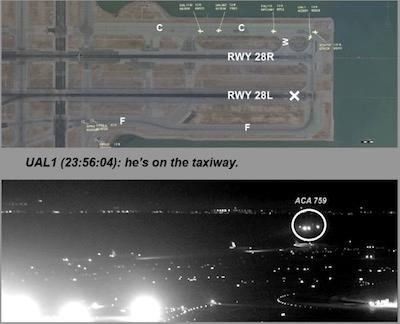Fri, Sep 28, 2018
NTSB Findings On Taxiway Overflight Shines Light On Need To Do More
The largest non-governmental aviation safety organization in the world, the Air Line Pilots Association, Int’l (ALPA), commends the National Transportation Safety Board (NTSB) for its recommendation that Canada strengthen its regulations on flight and duty time to better address pilot fatigue—a move that would enhance safety and help prevent future aviation accidents and incidents. The NTSB’s recommendations were part of the Board’s report following its investigation of the 2017 Air Canada taxiway overflight at San Francisco International Airport.

Canada’s current pilot fatigue rules lag drastically behind the rest of the world. In 2014, long-overdue draft regulations that would have brought Canada’s flight- and duty-time regulations in line with international standards were released. However, due to pressure from some industry stakeholders to slow the regulatory process and delay implementation, those new regulations have still not been enacted. ALPA maintains that safety risks will unnecessarily continue for those who work in the industry and for those who travel by air until adequate rules are finalized.
“Science-based flight-time, duty-time, and minimum rest requirements are some of the most important aviation safety initiatives for flight crews in Canada, and new rules to address the issue of pilot fatigue are long overdue. The NTSB’s recommendations today make clear that the time to act is now, and ALPA urges the Canadian government to move forward with enacting regulations that address this issue and improve aviation safety,” said Capt. Tim Canoll, ALPA president.
"Canada lags far behind the rest of the world when it comes to ensuring our pilots are well-rested when they are flying. Airline pilots, crews, and passengers deserve to work and travel in the safest environment possible, which is, in part, accomplished by implementing rules that are science-based, supported by data, and recognize safety as the priority," said ALPA Canada president Capt. Dan Adamus. "Therefore, we ask that the government adopt the proposed science-based regulations currently pending before the Treasury Board without further delay. While the proposed regulatory update does not reflect all of our concerns, we do acknowledge that because Canada is currently so drastically behind the rest of the world, they are a significant improvement to safety in the Canadian airline industry.”
(Source: ALPA news release. Image from file)
More News
Terminal Radar Service Area Airspace surrounding designated airports wherein ATC provides radar vectoring, sequencing, and separation on a full-time basis for all IFR and participa>[...]
Very High Frequency (VHF) The frequency band between 30 and 300 MHz. Portions of this band, 108 to 118 MHz, are used for certain NAVAIDs; 118 to 136 MHz are used for civil air/grou>[...]
“From approximately November 2021 through January 2022, Britton-Harr, acting on behalf of AeroVanti, entered into lease-purchase agreements for five Piaggio-manufactured airc>[...]
Also: Virtual FLRAA Prototype, IFR-Capable Autonomous A/C, NS-32 Crew, Golden Dome Missile Defense Bombardier announced that the first production Global 8000 successfully completed>[...]
Aero Linx: The 1-26 Association (Schweizer) The Association’s goal is to foster the helpfulness, the camaraderie, and the opportunity for head-to-head competition that is fou>[...]
 ANN's Daily Aero-Term (05.29.25): Terminal Radar Service Area
ANN's Daily Aero-Term (05.29.25): Terminal Radar Service Area ANN's Daily Aero-Term (05.30.25): Very High Frequency (VHF)
ANN's Daily Aero-Term (05.30.25): Very High Frequency (VHF) Aero-News: Quote of the Day (05.30.25)
Aero-News: Quote of the Day (05.30.25) Airborne 05.23.25: Global 8000, Qatar B747 Accepted, Aviation Merit Badge
Airborne 05.23.25: Global 8000, Qatar B747 Accepted, Aviation Merit Badge ANN's Daily Aero-Linx (05.30.25)
ANN's Daily Aero-Linx (05.30.25)



